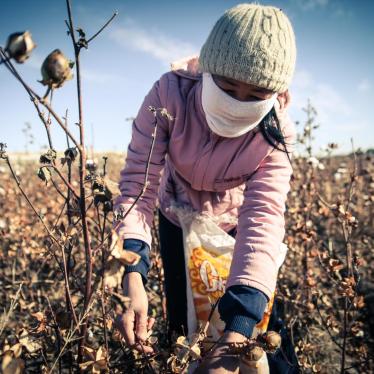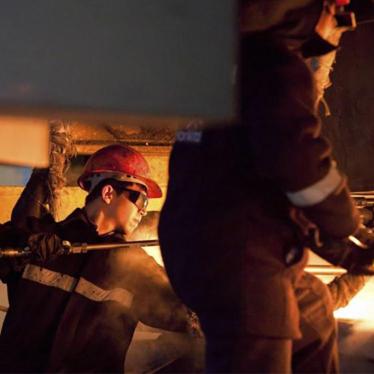(London, March 23, 2004)—The European Bank for Reconstruction and Development should suspend all public-sector lending to Uzbekistan until the Uzbek government makes real progress toward meeting the EBRD’s human rights benchmarks, Human Rights Watch said today in a letter sent to the bank jointly with the nongovernmental organization CEE Bankwatch Network.
In the coming days, the EBRD’s board of directors is scheduled to decide on the level of the bank’s engagement with Uzbekistan. This month marks the one-year deadline for the Uzbek government to make substantial, measurable progress on the series of benchmarks that the ERBD adopted in its country strategy last March.
Three of the benchmarks pertain specifically to human rights: greater political openness and freedom of the media, the free functioning and registration of independent civil society groups, and the implementation of recommendations by the United Nations (U.N.) Special Rapporteur on Torture following his 2002 visit to Uzbekistan.
In a briefing paper released today, Human Rights Watch documents the Uzbek government’s persistent failure to take the necessary reform steps in these three benchmark areas.
“When it set these benchmarks, the EBRD gave a clear signal that it expects reforms in exchange for engagement,” said Rachel Denber, acting executive director of Human Rights Watch’s Europe and Central Asia division. “Until these reforms are forthcoming, the bank should hold off on any investment that benefits the Uzbek government.”
Human Rights Watch said that exceptions could be made for projects that directly affect the health, education and well-being of the general population. However, projects falling into these categories need to be closely monitored to ensure that they serve their intended purpose.
The Uzbek government continues to harass and imprison human rights defenders. Since the adoption of the EBRD country strategy in March 2003, the government has not allowed a single independent political party or human rights group to register. Informal censorship of the media persists.
Torture and ill-treatment in prisons and police detention facilities remain widespread and occur with near-total impunity. Since May 2003 alone, at least four people have died in police custody, apparently due to torture. More than a year after the U.N. Special Rapporteur on Torture issued his report on Uzbekistan, the government has failed to publish a final National Action Plan for implementing his recommendations, despite having promised to release a final version before the end of 2003.
“The Uzbek government’s approach to the plan raises serious doubts about its will to implement the necessary reforms,” said Denber. “The persistent and continuing reports of torture and torture-related deaths in custody only highlight the government’s failure to implement the Special Rapporteur’s recommendations.”
Earlier this month, the Uzbek authorities transferred Ruslan Sharipov, an outspoken human rights defender and independent journalist, to a minimum security facility. However, the government refused to release Sharipov, who was imprisoned in May 2003 on politically-motivated charges, and has not initiated an independent review of the charges against him, which the international community has called for. Sharipov is serving a four-year sentence following a flawed trial and despite credible allegations of torture. He remains at a clear risk of further torture and mistreatment.
“Ruslan Sharipov should never have been imprisoned in the first place,” said Denber. “Anything short of his release is unacceptable.”
In its briefing paper and accompanying letter to the EBRD, Human Rights Watch called on the bank to continue to use the benchmarks as policy tools for reform, and to articulate the specific reform steps the Uzbek government needs to take in order to be considered in compliance with these goals.
Human Rights Watch also called on the EBRD to set up a coherent system of sustained monitoring of Uzbekistan’s progress in meeting the benchmarks. The bank should issue periodic public statements to reaffirm reform demands, and actively engage shareholder governments, partner institutions and civil society in putting pressure on the Uzbek government to implement the necessary reforms.
“We firmly believe that these benchmarks have a real potential to trigger human rights reforms in Uzbekistan, but only if they’re properly supported by resources and political will,” said Denber. “The EBRD can be effective only if its shareholder governments and the international community at large are prepared to promote the benchmarks as part of their overall dialogues with the Uzbek leadership.”
The briefing paper is the third in Human Rights Watch’s series of updates on Uzbekistan’s progress in meeting the EBRD benchmarks. The updates form part of a broad NGO campaign launched by Human Rights Watch and over 50 partners in May 2002, a year before the EBRD held its annual meeting in the Uzbek capital Tashkent. The campaign called on the EBRD to use the meeting to press for concrete progress in human rights in advance of it, and it continues to urge the bank to ensure that its overall engagement with Uzbekistan serves to promote democracy and human rights.






